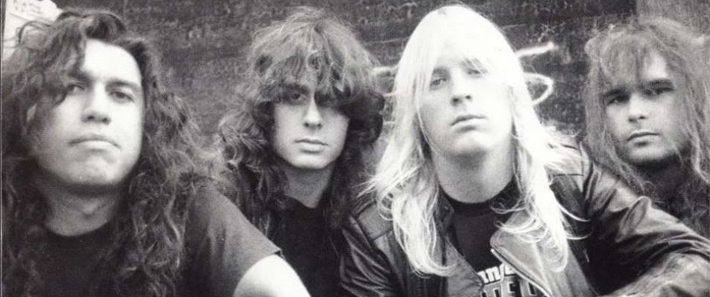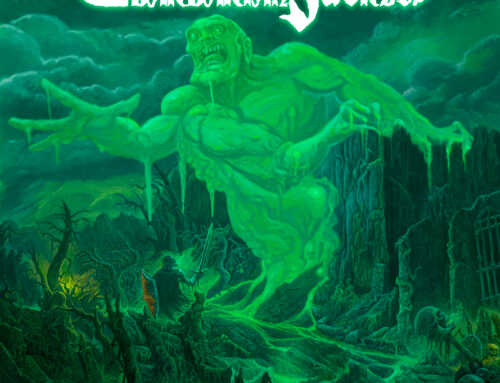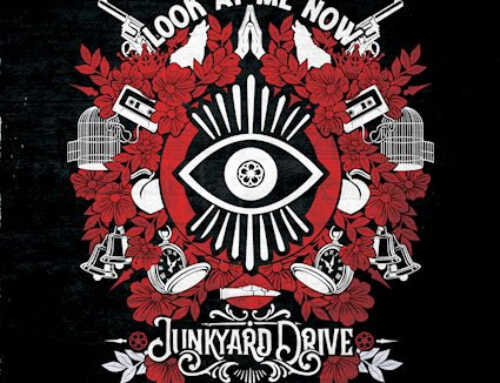The problem was that the band had all but painted themselves into a corner. They knew too well that Reign in Blood II would be redundant and reduce the impact of their magnum opus. Or maybe producer Rick Rubin decided it for them. Regardless, the band needed to do something different, and the unlikely solution was to slow down.
One notable difference with this LP was the predominance of lyrics from bassist/vocalist Tom Araya. Until then, he had made virtually no contributions to the band in that regard, but clearly he had plenty to say. The frontman delved deep into Miltonian themes and disturbing occult ritualism that points to Hell as mankind’s final destination. Araya also replaced his machine gun bark with an affected singing voice that sounded diabolical and detached in equal turns. His entranced recitations served to create a grand but uneasy atmosphere that helped make South of Heaven Slayer’s most ambitious and mature work ever.
When the album arrived in 1988, a lot of Slayer devotees cried foul. Why was Tom doing so much (actual) singing? Why were the songs getting longer? Where were the really fast parts? While the album was ultimately a commercial and critical success, it took years for the metal community to fully embrace it. Even today, some otherwise dedicated fans remain dismissive. If you’re reading this and still saying, “Yeah, but Angel of Death…!” then please check out the song by song critique below to rediscover one of the best metal albums ever.
South of Heaven – “The root of all evil is the heart of a black soul”
The track drifts in with a dire introduction that includes semi-acoustic guitars, and it is immediately clear that this LP is going to be a very different ride. While such a nuanced approach was unusual for the band at the time, it ultimately became one of Slayer’s best-known songs through sheer distinctiveness. As he does throughout the album, guitarist Jeff Hanneman employs his songcraft with an ear towards bombastic classical arrangements. The song starts slowly, but it builds in every verse to finally reach a cacophonous climax of pounding drums and howling guitar feedback. Tom Araya follows suit with an increasingly profane litany that could have been ripped from the pages of the Book of Revelation. The darkness in tone and message makes South of Heaven one of Slayer’s most inflammatory and intimidating tracks. No bursts of speed are applied anywhere in the song; this is where the band issued a revised mission statement, one that proved they could take their music to new levels of blackened grandeur without relying on convention.
Silent Scream – “Death is fucking you insane”
Here’s an intriguingly ambiguous track about abortion that got fans talking. Was it a condemnation, or perhaps just a pragmatic examination? No matter how you turn it, Slayer took a controversial modern topic and cast in an arcane light that made it sound more like a pagan ritual than a medical procedure. Some of the album’s most evocative lyrics are featured here, and the song’s violent pace showcases them to maximum efficacy. The poetry is unconventional, but the melody makes it patently singable. Regardless of where lyricist Araya really stands on the issue, it doesn’t change the fact that Silent Scream is one hell of a ripping tune.
Live Undead – “Laughing as you eternally rot”
Here we witness the greatest self-referential song in the history of metal. It’s also one of the best songs about zombies ever. Slayer’s quintessential live release, Live Undead, preceded South of Heaven, so it’s hard to say if the song or the title came first. Either way, lyricist Araya ran with the ball and came up with some compelling imagery. This entry highlights Jeff Hanneman‘s composition abilities, and it also showcases an exploration of different vocal approaches. Araya’s tone starts with a hypnotic meter that matches the slow burn of the first and second verses, both of which are intercepted by fractured solos from Hanneman and counterpart Kerry King, respectively. After the arrival of Tom’s famous shriek (which is also the last time it ever appears on any of Slayer’s studio recordings), he proceeds to the song’s bridge with morose wailing. From there, everything explodes into the galloping Slayer standard we know and love. Drums become hurried, solos trade off with each verse, and Araya’s delivery becomes fevered and raging until the pummeling finale. The dead have awakened, and humanity is doomed.
Behind the Crooked Cross – “March on through the rivers of red”
This was another one penned by Jeff Hanneman, and he reportedly hates it. In case you somehow missed it, the ‘crooked cross’ in question is the swastika, and the lyrics tell the story of troops ordered to their deaths on the battlefield. At first glance, it’s a conventional song about the horrors of war embellished with adept turns of phrase. Then again, it also offers sympathy to German soldiers in World War II, many of whom had little to do with the crimes of their leaders and were forced to fight and die for the cause. Plenty of metal songs have since examined the plight of soldiers on all sides of the battlefield, but in 1988 it was an unusual move.
Mandatory Suicide – “Blood’s cheap – it’s everywhere”
In many ways, South of Heaven proved to be a conceptual crossroads for Slayer; they were moving away from the death worship and Satanism of their early material and heading towards more songs about war and modern concerns. Mandatory Suicide is a companion to Behind the Crooked Cross in its illustrative portrayal of the chaos in armed conflict. While this song could have been a pedestrian exercise, the meaty riffs and Tom’s deadpan descriptions of what it’s like to be shot to death and blown up makes Mandatory Suicide hold up well in the established context of the album.
B-sides of albums have historically had a tepid reputation. Back when vinyl was the only viable format for music, most artists put their strongest material on side A and left the filler for side B. Metal bands have always bucked that trend, and South of Heaven was no different. These songs are part of what makes this album strong from start to finish. If it has been a while since you bothered to flip over this classic LP, perhaps the assessments below will change your mind.

Ghosts of War – “Memories can’t ignore… Rise ghosts of war”
Here again is another song about war, though this one is more about the lingering trauma and horror that soldiers bring home with them. Kerry King is a weak lyricist compared to Araya and Hanneman, so accordingly this song is the weakest of the album. That’s not saying much in this case, however; Ghosts of War is overall a fine effort that packs a solid punch, particularly in its explosive introduction, but it would never make it to a list of essential Slayer tracks.
Read Between the Lies – “You may believe it, but Satan wouldn’t lie”
Criminal behaviour amongst televangelists was a hot topic at the end of the ’80s, and just about every metal band of the era had a song about it. Slayer’s entry is one of the better ones, as it attacks the subject with a sneer instead of outrage. They always knew that self-righteous creeps like Jim Bakker were giant hypocrites, so Read Between the Lies was probably a song that all but wrote itself.
Cleanse the Soul – “Empty altar awaits its victim, stained glass windows black”
For the last third of the album, Slayer steers back into occult territory with a track that describes a human sacrifice. It was nothing new for metal bands of the time, but the intrigue comes from the examination of the process as something far more transcendent than murder. Sacrifices are made in the name of harnessing otherworldly powers, and Araya (with the help of King, surprisingly) captures the conviction of the act with disturbing insight. Much like Ghosts of War, this song doesn’t do as well by itself, though it definitely counts as a sleeper hit.
Dissident Aggressor – “Exploding, reloading, this quest never ending”
It’s always weird to consider how many Slayer fans don’t pick up on the heavy Judas Priest influence that courses through their work. By the time South of Heaven arrived, Slayer had already discovered a voice of their own, and their decision to cover this oddball Priest track seemed like a heartfelt farewell to their forebears. While cover songs are usually black and white in terms of success (or lack thereof), Slayer managed to recreate the song in their image and slot it perfectly into an already powerful assembly of original compositions. They took a few minor liberties in the process (Tom clearly didn’t dig the “Stab! Bawl! Punch! Crawl!” passage very much), but overall it stands as a faithful rendition while allowing the album to flow smoothly to its proper conclusion.
Spill the Blood – “Now smell the stench of immortality”
And last but not least, we have one of Slayer’s most underrated songs. Spill the Blood seems to be a companion piece to South of Heaven, but the band wisely decided to use it as a bookend for the album. The track starts off with a gilded spiderweb of semi-acoustic guitars (much like the ones featured in the title track) which give way to angry power chord strikes. Much like its sister song, Spill the Blood never acquires much velocity, but therein lies the beauty; this is a controlled piece of dark narrative where bloodletting meets eroticism in the name of embracing death.
Araya returns to his somnolent delivery and creates a sense of spellbinding unease as he implores the listener to “take my hand and let go of your life”. Slayer clearly liked this track a lot at the time; they even made a shirt for it with the lyrics on the back. The shirt with the scroll and the warlock with the blue cloak? That’s the one. It’s a safe bet that Slayer hasn’t played this live since their first tour of the album, which is a shame since it’s one of the best songs here, and perhaps one of Slayer’s best songs ever.







Leave A Comment